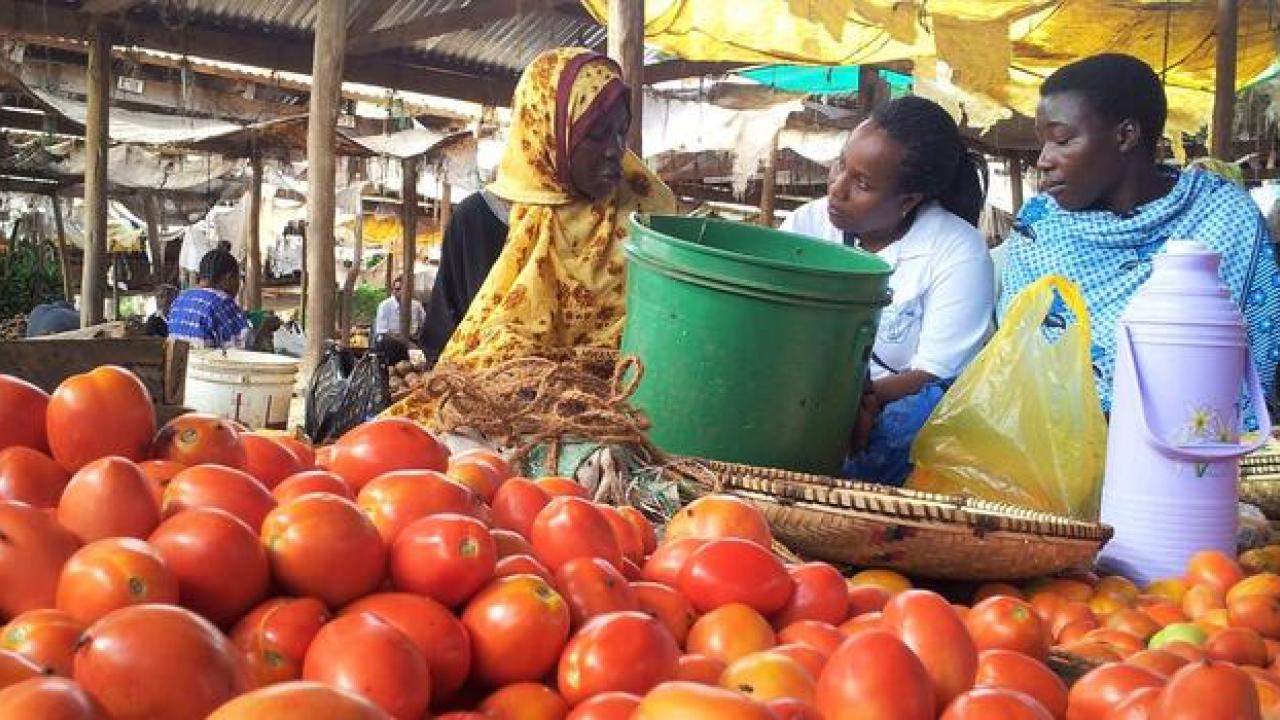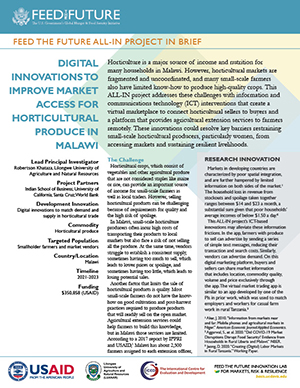
Horticulture is a major source of income and nutrition for many households in Malawi. However, horticultural markets are fragmented and uncoordinated, and many small-scale farmers also have limited know-how to produce high-quality crops. This ALL-IN project addresses these challenges with information and communications technology (ICT) interventions that create a virtual marketplace to connect horticultural sellers to buyers and a platform that provides agricultural extension services to farmers remotely. These innovations could resolve key barriers restraining small-scale horticultural producers, particularly women, from accessing markets and sustaining resilient livelihoods.
Project Overview
Lead Principal Investigator: Robertson Khataza, Lilongwe University of Agriculture and Natural Resources
Project Partners: Indian School of Business; University of California, Santa Cruz; World Bank
Development Innovation: Digital innovations to match demand and supply in horticultural trade
Commodity: Horticultural produce
Targeted Population: Smallholder farmers and market vendors
Country/Location: Malawi
Timeline: 2021-2024
Funding: $350,858 (USAID)
The Challenge
Horticultural crops, which consist of vegetables and other agricultural produce that are not considered staples like maize or rice, can provide an important source of income for small-scale farmers as well as local traders. However, selling horticultural products can be challenging because of requirements for quality and the high risk of spoilage.
In Malawi, small-scale horticulture producers often incur high costs of transporting their products to local markets but also face a risk of not selling all the produce. At the same time, vendors struggle to establish a consistent supply, sometimes having too much to sell, which leads to lower prices or spoilage, and sometimes having too little, which leads to losing potential sales.
Another factor that limits the sale of horticultural products is quality. Most small-scale farmers do not have the know-how on good cultivation and post-harvest practices required to produce products that will readily sell on the open market. Agricultural extension services could help farmers to build this knowledge, but in Malawi those services are limited. According to a 2017 report by IFPRI and USAID,1 Malawi has about 2,500 farmers assigned to each extension officer, a number that is far higher than other countries in the region.

Research Design
An ALL-IN research team led by Lilongwe University of Agriculture and Natural Resources is implementing information communications technology (ICT) interventions in Malawi that coordinate local horticulture markets and support small-scale farmers in producing high-quality products for sale. The first is a virtual marketplace in the form of a cell phone-based app to connect buyers and sellers. The second is an interactive voice response (IVR)-based agricultural extension hotline that farmers can call from their cell phones to access advisory services and improve the quality of their produce.
The research team is implementing these two interventions as a randomized controlled trial (RCT) in order to measure their true impacts by comparing outcomes for farmers and vendors in markets that receive the virtual market app and extension hotline to similar farmers and vendors in markets that don’t.
The project takes place in 150 market centers throughout Malawi. The team is measuring outcomes in a number of different areas for both farmers and vendors, including agricultural yields, revenues and profits, use of mobile money, rates of spoilage and other measures that indicate better-integrated markets. The project includes a total of 1,200 vendors and farmers.
The intervention is designed to impact all crops with a particular focus on vegetables, since barriers to trading vegetables are more severe due to their perishability. There are two main vegetable seasons in Malawi, one occurring from December to April and a second during the dry months from May to November. Prior to the beginning of the vegetable season, the research teams are conducting meetings with groups of vendors as well as village meetings with farmers. In these meetings, the virtual marketplace app is introduced, and people will be given a chance to experiment with its functionality.
Development Impact
These paired ICT interventions could show potential to provide wide benefits across local horticulture markets in Malawi. For farmers, they could reduce transaction costs and facilitate sales, increasing profits and reducing spoilage. For vendors, these interventions could increase access to high-quality produce while improving inventory management, both of which can increase sales and profits.
This project aligns with The Feed the Future Multi-Year Strategy for Malawi and Malawi Government plans that focus on reducing poverty and under-nutrition. Supporting entrepreneurship and sustainably achieving food and nutrition security are among the Malawi Government’s policy goals pursued through the Malawi Growth and Development Strategy (MGDS). The project also aligns with the USAID Country Development Cooperation Strategy for Malawi by supporting resilient households, communities and systems to manage and reduce vulnerabilities (IR 3.1) as well as an enabling environment for wealth creation (IR 3.3).
The project also explicitly focuses on the inclusive and transformative gender approach, which seeks to promote economic empowerment among women by improving their entrepreneurial knowledge through the use of smart technologies. Women farmers in Malawi are actively involved in food-commodity trade, especially in the selling of vegetables and fruits in local markets.
[1] Cai, T., et al. 2017. “Malawi: Desk Study of Extension and Advisory Services - Developing Local Extension Capacity (DLEC) Project.” USAID/IFPRI.
This report is made possible by the generous support of the American people through the United States Agency for International Development (USAID) cooperative agreement 7200AA19LE00004. The contents are the responsibility of the Feed the Future Innovation Lab for Markets, Risk and Resilience and do not necessarily reflect the views of USAID or the United States Government.
